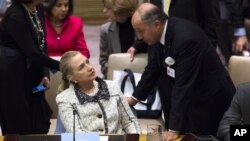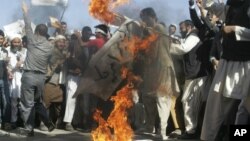UNITED NATIONS —
U.S. Secretary of State Hillary Clinton says al-Qaida-affiliated terrorists may have been part of this month's attack on the U.S. mission in the Libyan city of Benghazi that killed the U.S. ambassador and three other Americans.
Opinion & Analysis
She told a U.N.-organized meeting on instability in the Sahel that the United States is stepping up counterterrorism efforts across the region.
"We’re working with the Libyan government and other partners to find those responsible for the attack on our diplomatic post in Benghazi and bring them to justice. But we are also expanding our counterterrorism partnerships to help countries meet their own growing threats. We’re taking aim at the support structure of al-Qaida and its affiliates - closing safe havens, cutting off finances, countering their ideology and denying them recruits," she said.
Secretary Clinton says al-Qaida in the Islamic Maghreb and other terrorist groups are using instability in Africa's Sahel region to expand their operations. "Now with a larger safe haven and increased freedom to maneuver, terrorists are seeking to extend their reach and their networks in multiple directions. And they are working with other violent extremists to undermine the democratic transitions under way in North Africa, as we tragically saw in Benghazi," she said.
U.S. Ambassador Chris Stevens and three other Americans were killed in Benghazi following protests against an Internet video mocking the Prophet Muhammad that was produced by an anti-Muslim filmmaker in California.
The Obama administration says the Benghazi killings were a terrorist attack, but Secretary Clinton's comments are the first to link the violence to affiliates of the al-Qaida network.
What's Behind the Protests
WHAT'S BEHIND THE PROTESTS?
Opinion & Analysis
"We’re working with the Libyan government and other partners to find those responsible for the attack on our diplomatic post in Benghazi and bring them to justice. But we are also expanding our counterterrorism partnerships to help countries meet their own growing threats. We’re taking aim at the support structure of al-Qaida and its affiliates - closing safe havens, cutting off finances, countering their ideology and denying them recruits," she said.
Libyan President Mohamed Magariaf also says the attacks were carried out by what he calls "al-Qaida elements who are hiding in Libya."
President Magariaf and Secretary Clinton met privately on the sidelines of the U.N. General Assembly. A senior State Department official says the Libyan leader discussed two fundamental threats to Libyan security: extremists with their own agendas and remnants of the former government of Moammar Gadhafi.
Secretary Clinton says strengthening democratic institutions is at the heart of Washington's counterterrorism strategy. "It is democracies that offer their citizens constructive outlets for political grievances, create opportunities for upward mobility and prosperity, and are clear alternatives to violent extremism. And their success offers a powerful rejection of the extremist ideology of hate and violence as we also saw in Benghazi last week," she said.
She says civilians in Benghazi who demonstrated against that violence reclaimed the honor and dignity of what she calls a courageous city. She says the people of the region deserve better from their leaders and deserve better from the international community.





